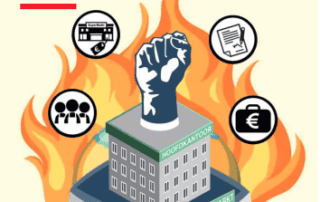Director’s liability franchisor for bank debt franchisee?
A judgment of the District Court of Rotterdam dated 16 March 2016, ECLI:NL:RBROT:2016:1769, dealt with the question, among other things, of whether the director of a franchisor could be held personally liable for the bank debt incurred by a franchisee. The bank debt was incurred by the franchisee in the context of the implementation of the franchise agreement with the franchisor and the exploitation of the franchise formula.
The bank demanded repayment of the debt from the franchisee. The bank had terminated the financing agreement in early 2010 because the franchisee did not meet the periodic repayment agreements. The franchisee defended himself, among other things, by stating that the director of the franchisor should repay this debt to the bank, because, in the opinion of the franchisee, this director had acted unlawfully and apparently performed his duties as director improperly. According to the franchisee, the franchisor’s director had withdrawn funds from the franchisor’s company for his son’s racing activities. As a result, the franchisor had gone bankrupt at the beginning of 2010 and the franchisee, who was completely dependent on the franchisee for his business operations, could no longer operate his business as a franchisee. According to the franchisee, the consequence of this was that the franchisee was no longer able to pay the bank debt.
The director of the franchisor has pointed out that after the beginning of 2010 he was no longer held accountable for the alleged liability by the franchisee, until the summons in mid-2015. The court rules that the franchisee’s claim against the franchisor has thus become time-barred pursuant to Section 3:310 of the Dutch Civil Code.
Incidentally, the Supreme Court had already ruled in its judgment of 14 November 2014, ECLI:NL:HR:2014:3240, that claims for compensation based on tort in the context of directors’ and officers’ liability pursuant to Article 3:310 of the Dutch Civil Code become time-barred after five years. .
It is also striking that the franchisee cites “manifestly improper management” as a liability criterion. That standard seems to be derived from the standard that is reserved for the trustee pursuant to Section 2:248 of the Dutch Civil Code. According to settled case law of the Supreme Court, the criterion for directors’ liability based on tort is whether a “serious personal fault” can be made. See, for example, HR 6 February 2015, ECLI:NL:HR:2015:246. Even if there were no statute of limitations, the question would still be whether the claim would succeed now that this criterion is a heavier one than for the “ordinary” tort.
mr. AW Dolphijn – Franchise lawyer
Ludwig & Van Dam Franchise attorneys, franchise legal advice.
Do you want to respond? Go to dolphijn@ludwigvandam.nl

Other messages
Hard or soft? That makes a difference!
Hard or soft? That makes a difference! In practice, ...
Post non-competition ban without a signed franchise agreement
Is a franchisee bound by a post-competition ban without ...
Post non-competition ban without a signed franchise agreement
Is a franchisee bound by a post-competition ban without a ...
Post non-compete clause in hard franchising
The summary proceedings judge of the Amsterdam District Court ...
Does an agreed rent indexation always apply?
Many entrepreneurs were confronted with a significant rent increase ...
Ludwig & Van Dam in Distrifood Magazine about the Franchise Act
Interview about the current obstacles for independent supermarket entrepreneurs and ...






